Nov 29, 2024
Surah Al A'araf (Verses 59-64)
بِسْمِ ٱللَّٰهِ ٱلرَّحْمَٰنِ ٱلرَّحِيمِ,
(bi-smi llāhi r-raḥmāni r-raḥīm)
"In the name of Allah, the Most Gracious, the Most Merciful"
"Assalamualaikum/Hello and welcome! It's a pleasure to have you join us on this platform. Feel free to explore and engage with our community."
Feel free to join the cafe and our Instagram page for notifications and updates;
Hilokal;
https://hilokal.page.link/eUxfM
Instagram;
https://instagram.com/ideologyovlife?igshid=NjIwNzIyMDk2Mg==
Chapter 7, Verses 59-64
Surah Al-A'araf, Verses 59-64
Recitation.
Translation.
Tafseer.
LESSON # 8 Chapter # 7 (Surah Al A'araf)
For English Reference;
https://www.islamicstudies.info/tafheem.php?sura=7&verse=59&to=64
For Urdu Reference;
https://tafheem.net/islamikitabein/urduref.php?sura=7&verse=59-64
Translations;
Please follow the sequence to find your language;
English
Urdu
Hindi
Tamil
Bangali
Korean
Kurdish
Turkish
Portuguese
Spanish
LESSON # 8 of Chapter # 7.
Difficult Vocabularies from LESSON # 8 (Chapter # 7 Verses 59-64)
Verse # 59.
1- Excavation. (Noun)
(The act of removing earth that is covering very old objects buried in the ground in order to discover things about the past.)
2- Inscriptions. (Noun)
(Words that are written or cut in something.)
3- Vicinity. (Noun)
(The area around a place or where the speaker is.)
4- Dispersed. (Adjective)
(Spread across a large area.)
5- Malady. (Noun)
(A Disease.)
6- Contrived. (Adjective)
(Artificial and difficult to believe.)
7- Monopolized. (Verb)
(In business, to control something completely and to prevent other people having any effect on what happens.)
8- Immense. (Adjective)
(Extremely large in size or degree.)
9- Thwart. (Verb)
(To stop something from happening or someone from doing something.)
10- Clergy. (Noun)
(Religious leaders, especially Christian priests, ministers, etc.)
11- Progeny. (Noun)
(The young or offspring of a person, animal, or plant.)
Verse # 60.
12- Palpable. (Adjective)
(So obvious that it can easily be seen or known, or (of a feeling) so strong that it seems as if it can be touched or physically felt.)
Verse # 63.
13- Vindicate. (Verb)
(To prove that what someone said or did was right or true, after other people thought it was wrong)
Verse # 64.
14- Brevity. (Noun)
(Using only a few words or lasting only a short time)
15- Didactic. (Adjective)
(Intended to teach, especially in a way that is too determined or eager, and often fixed and unwilling to change)
16- Agitate. (Verb)
(To make someone feel worried or angry)
17- Scourg. (Noun)
(Something or someone that causes great suffering or a lot of trouble)
18- Catastrophic. (Noun)
(A sudden event that causes very great trouble or destruction)
19- Afflict. (Verb)
(If a problem or illness afflicts a person or thing, they or it suffer from it.)
20- Stupor. (Noun)
(A state in which a person is almost unconscious and their thoughts are not clear.)
21- Adamantly. (Adverb)
(In a way that means it is impossible to persuade you or make you change your opinion or decision.)
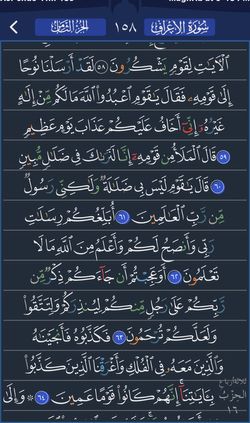
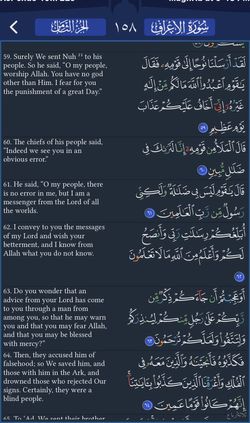

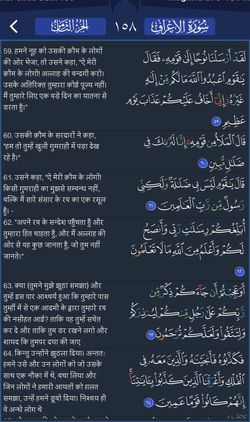
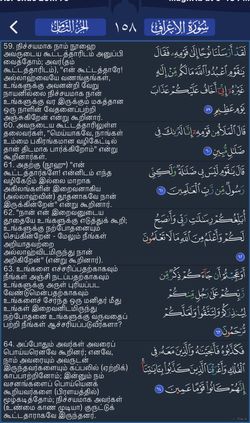
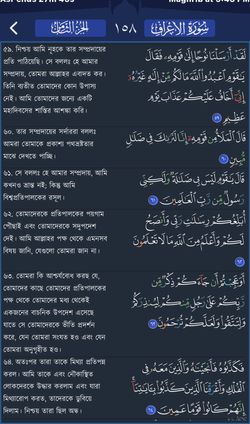

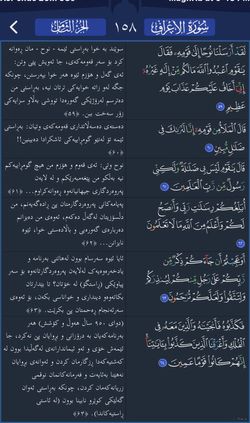
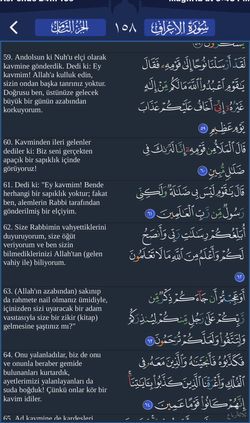

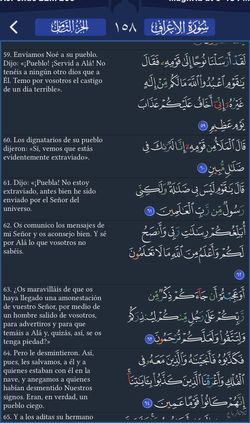
LESSON # 8 of Chapter # 7.
References from LESSON # 8 (Chapter # 7 Verses 59-64)
Verse # 59.
1- Al Qur'aan (11:25-48)
https://islamicstudies.info/reference.php?sura=11&verse=25&to=48
2- Al Qur'aan (26:105-122)
https://islamicstudies.info/reference.php?sura=26&verse=105&to=122
3- Al Qur'aan (71:1-28)
https://islamicstudies.info/reference.php?sura=71&verse=1&to=28
Verse # 64
4- Al Qur'aan (29:14)
https://islamicstudies.info/reference.php?sura=29&verse=14
LESSON # 8 of Chapter # 7.
Summary of Verses (59-64) of Chapter # 7 Surah Al A'araf:
Here is a short summary of the verses from Surah Al-A'raf
1- Introduction to Prophet Noah's Mission:
Prophet Noah was sent to guide his people away from polytheism, urging them to worship Allah alone. He feared for their punishment if they did not change their ways.
2- Historical Context of Noah’s People:
Noah’s people were the first to deviate from the righteous path followed by Adam. Their land, historically believed to be in modern-day Iraq (near Mosul), was the setting for Noah's mission. This account is corroborated by various ancient traditions from different cultures.
3- Polytheism and Corruption:
The people of Noah did not deny God's existence but had fallen into polytheism, associating others with Allah. This led to social, religious, and political corruption, as a class of clergy monopolized power and perpetuated injustice.
4- Noah’s Call to Reform:
Noah patiently called his people to abandon idol worship and follow Allah’s guidance. Despite his sincere efforts, the religious elite opposed him, leading Noah to seek divine intervention to rid the earth of misguiders.
5- Noah’s Response to Objections:
When the leaders of Noah’s people rejected him and accused him of error, Noah asserted that he was a true Messenger from God, bringing them divine messages to save them from evil and show them mercy.
6- Parallel to Prophet Muhammad’s Mission:
Similar to Noah’s experience, the Prophet Muhammad (peace be upon him) faced rejection and objections from his people. Both prophets encountered the same doubts and resistance to their message, which highlights the consistency of divine guidance across time.
7- Rejection of Noah’s Message and the Flood:
Despite Noah’s warnings, his people rejected him, and God sent the flood to destroy the disbelievers, saving Noah and his followers in the Ark. This event is seen as a lesson about the consequences of rejecting God's message.
8- The Duration of Noah’s Mission:
The Qur’an presents Noah's mission as a long struggle, emphasizing patience and perseverance. It teaches that despite facing rejection and adversity, prophets must continue their efforts for the truth, as they will ultimately be vindicated.
9- Divine Justice and the Punishment of Rejection:
The rejection of a Prophet’s message by a people directly leads to severe divine punishment. While nations today may not face the same catastrophic punishments as in the past, God's warnings and punishments still exist in different forms, affecting nations steeped in moral corruption.
10- Moral Lessons for Contemporary Times:
The story of Noah’s people serves as a reminder that when a nation ignores divine guidance and continues in moral decay, it faces punishment. Today, nations still experience both minor and major consequences for moral and ideological error, though without direct prophetic intervention.
Thank you everyone for joining.
May Allah rewards all of you for your precious time spent here & may Allah keeps pouring his blessings upon you and your loved ones.
Stay safe & and blessed.
Aslamualaikum to all of you.
J A Z A K A L L A H U K H A I R E V E R Y O N E .
By undefined
18 notes ・ 2 views
English
Proficient